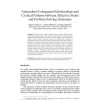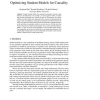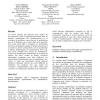605 search results - page 110 / 121 » To Tutor or Not to Tutor: That is the Question |
IUI
1997
ACM
13 years 12 months ago
1997
ACM
Intelligentlearning environments that support constructivism shouldprovideactivelearningexperiencesthatarecustomized for individuallearners. To do so, they must determine learner ...
AIED
2009
Springer
13 years 11 months ago
2009
Springer
We explored the complex interplay between students' affective states and problem solving outcomes. We conducted a study where 41 students solved 28 analytical reasoning proble...
ITS
2010
Springer
13 years 11 months ago
2010
Springer
Pedagogical tutorial tactics are policies for a tutor to decide the next action when there are multiple actions available. When the contents were controlled so as to be the same, l...
AIED
2007
Springer
13 years 11 months ago
2007
Springer
Complex student models often include key parameters critical to their behavior and effectiveness. For example, one meta-cognitive model of student help-seeking in intelligent tutor...
ITS
2000
Springer
13 years 11 months ago
2000
Springer
This paper presents an approach to the design of a learning environment in a mathematical domain (elementary combinatorics) where problem solving is based more on modelling than o...



